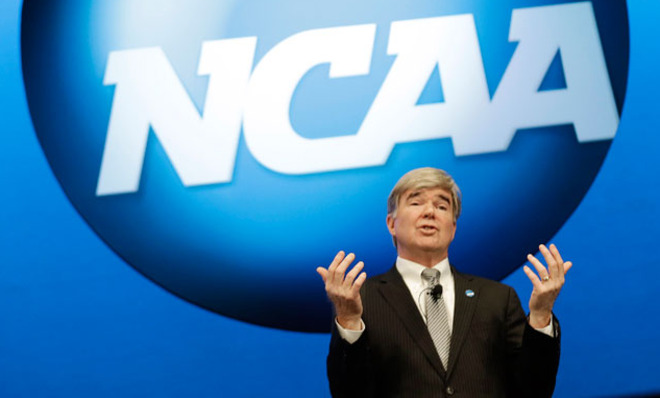The NCAA's bumbling, stumbling attempts to assert its authority
Another college sports scandal meets another capricious punishment


A free daily email with the biggest news stories of the day – and the best features from TheWeek.com
You are now subscribed
Your newsletter sign-up was successful
The NCAA on Tuesday sanctioned the University of Miami for a decade of infractions, stripping it of nine scholarships over three years but stopping short of banning it from postseason play. Miami had imposed its own postseason ban the past two years to try and avoid further retribution, a tactic that largely worked out in its favor.
The punishment is the culmination of a two-year investigation by the NCAA that embarrassed the NCAA nearly as much as it exposed failings at the university. And it's only the latest in a string of high-profile, puzzling attempts by the NCAA to reaffirm its authority over college sports.
In the case of Miami, the NCAA alleged that the school "lacked institutional control" over its own programs, which allowed a rogue former booster, Nevin Shapiro, to treat student athletes to lavish gifts, parties, and strippers. The 18 alleged violations — detailed in 79 separate incidents — "enabled a culture of noncompliance" at Miami, the NCAA said.
The Week
Escape your echo chamber. Get the facts behind the news, plus analysis from multiple perspectives.

Sign up for The Week's Free Newsletters
From our morning news briefing to a weekly Good News Newsletter, get the best of The Week delivered directly to your inbox.
From our morning news briefing to a weekly Good News Newsletter, get the best of The Week delivered directly to your inbox.
Shapiro spilled the beans on his activities after being accused of running a $930 million Ponzi scheme. But with Shapiro's civil trial moving forward, the NCAA inexplicably hired his personal defense lawyer, Maria Elena Perez, to investigate Shapiro's finances on their behalf, too. In short, the NCAA was paying Perez to dig up dirt on her own client.
NCAA head Mark Emmert, in a tone-deaf statement, said it was "stunning" and vowed to get to the bottom of it. Yet the blatant conflict of interest, on top of the NCAA's "corrupt enforcement decisions," wrote Sports Illustrated's Stewart Mandel, "destroyed what little confidence the public still held in [Emmert's] organization."
"You'd call these guys Keystone Kops if not for the fact they make actual Keystone Kops look like Dragnet," he added.
The Miami case is only the latest blemish for the NCAA, another reminder of its capricious approach to enforcement.
A free daily email with the biggest news stories of the day – and the best features from TheWeek.com
The Penn State child abuse scandal was by far the worst of the lot, an incident so horrific it redefined the college sports scandal. The NCAA considered hitting the school in 2012 with a "death penalty" — the termination, for a few years, of its football program — but went instead with an unprecedented fine and the loss of scholarships that even critics of Penn State's administration found heavy-handed.
One year later, the NCAA walked back those sanctions, saying the school had instituted necessary reforms.
Meanwhile, the University of Southern California has had its requests for reduced punishment repeatedly denied. USC lost scholarships and received a two-year Bowl ban over "impermissible benefits" given to two former players, crimes well short of the serial child abuse at Penn State.
USC's complaint of unfair treatment grew louder following the announcement of the Miami sanctions, with USC Athletic Director Pat Haden telling USA Today, "We have always felt that our penalties were too harsh," and adding that the Miami ruling "only bolsters that view."
NCAA punishments have been all over the map, ranging from light to severe. "They don't follow any rhyme or reason or precedent that they should," David Ridpath, a sports professor at Ohio University, told the New York Times.
There's the case of Johnny Manziel, Texas A&M's high-profile quarterback, who was accused of accepting money in exchange for signing autographs; he received a half-game suspension in a meaningless season-opening game. Compare that to the case of Ohio State football players accused of getting free tattoos for being local sports heroes; the NCAA suspended five players for multiple games and banned the team from Bowl play.
The NCAA, for its part, said it could not compare cases against each other because "each case is unique." While that's certainly true, the NCAA's bungling of investigations and decision to walk back its most notorious punishment undermine its credibility to make such distinctions.
It's bad enough for the NCAA to cling to an antiquated ideal in which everyone in college sports profits except the athletes. It's arguably worse that the NCAA can't even figure out a logical way to enforce that rule either.
Jon Terbush is an associate editor at TheWeek.com covering politics, sports, and other things he finds interesting. He has previously written for Talking Points Memo, Raw Story, and Business Insider.
-
 Mixing up mixology: The year ahead in cocktail and bar trends
Mixing up mixology: The year ahead in cocktail and bar trendsthe week recommends It’s hojicha vs. matcha, plus a whole lot more
-
 Labor secretary’s husband barred amid assault probe
Labor secretary’s husband barred amid assault probeSpeed Read Shawn DeRemer, the husband of Labor Secretary Lori Chavez-DeRemer, has been accused of sexual assault
-
 Trump touts pledges at 1st Board of Peace meeting
Trump touts pledges at 1st Board of Peace meetingSpeed Read At the inaugural meeting, the president announced nine countries have agreed to pledge a combined $7 billion for a Gaza relief package
